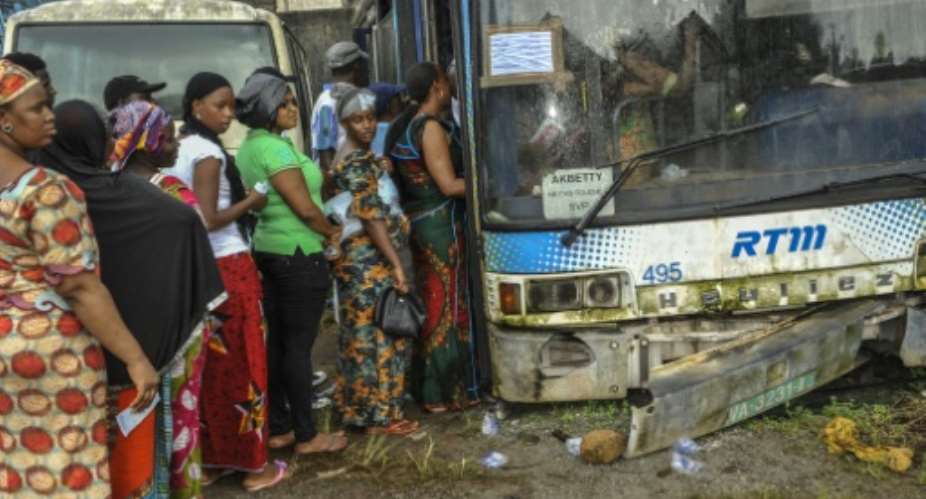Conakry (AFP) - Guinea's opposition leader Saturday called for demonstrations against the "serious denial of democracy" in the first round of presidential elections won by incumbent Alpha Conde.
Cellou Dalein Diallo said he would not resort to the west African country's constitutional court to protest what he labelled an "illegal" election, allegedly tainted by widespread fraud and mismanagement. Instead, he would ask supporters to take to the streets.
"I will invite, at the appropriate time, other candidates and all citizens who are the true victims of this electoral hold-up to organise, conforming to the law, peaceful demonstrations to express our indignation and protest against this serious denial of democracy," said Diallo, Conde's main rival, in a statement read to the media.
Reading a list of alleged irregularities, he said the six other candidates for president have all decided not to recognise the results of the first round on October 11.
"I confirm my total agreement with this decision. Furthermore, I will not take recourse at the constitutional court," he said.
The opposition's response has raised the spectre of unrest in the coming days. The poor west African state has a history of post-election violence, prompting the international community to call on all parties to pursue their grievances through the courts rather than protests.
Results published by the Independent National Electoral Commission late Friday showed Conde winning an outright majority with nearly 2.2 million votes. He is expected to be officially declared the winner on Saturday.
Diallo had garnered a little more than one million votes. Turnout was put at around 68 percent of the six million eligible voters, well below an initial estimate of 75 percent.
The election was only the second democratic presidential poll since Guinea gained independence from France in 1958.
Conde, 77, had gone into the campaign promising to deliver a "KO blow" to his opponents by winning in the first round and avoiding a run-off against his closest rival.
- 'Illegal' election -
Guinea's first ever democratic election in 2010 went to a second round between Conde and former prime minister Diallo, which Conde narrowly won.
Unlike that vote Diallo would not grudgingly concede defeat in this year's election.
"When the president (of the electoral commission) decides that anyone holding an electoral card can vote, even without an envelope in violation of the electoral code, it shows the illegal way in which the election has taken place," Diallo said.
The 63-year-old and the six other opposition candidates have all demanded a re-run and warned a proclamation of victory by Conde at the first round would vindicate their suspicions of vote-rigging.
The election has increased tensions in the country, with around a dozen people killed in clashes between Conde and Diallo supporters ahead of polling day.
An EU election observer team criticised the electoral commission for poor organisation and a "lack of preparation".
Conde, who spent nearly three decades in exile in France, led the opposition to Guinea's dictatorial first president after independence from France, Ahmed Sekou Toure.
He says the achievements of his presidency include an overhaul of the army and judiciary, the completion of a hydroelectric dam and reforms to make mining contracts more transparent.
Despite being rich in bauxite, the ore used to produce aluminium, Guinea is one of the world's poorest and was blindsided by a severe outbreak of Ebola, which began in the country's southern forests in December 2013 and then spread to neighbouring countries.
Half the population lives below the UN poverty line, and according to the World Bank, per capita income in 2014 was just $470 with many lacking access to electricity or running water.





 Lay KPMG audit report on SML-GRA contract before Parliament – Isaac Adongo tells...
Lay KPMG audit report on SML-GRA contract before Parliament – Isaac Adongo tells...
 Supervisor remanded for stabbing businessman with broken bottle and screwdriver
Supervisor remanded for stabbing businessman with broken bottle and screwdriver
 NDC watching EC and NPP closely on Returning Officer recruitment — Omane Boamah
NDC watching EC and NPP closely on Returning Officer recruitment — Omane Boamah
 Your decision to contest for president again is pathetic – Annoh-Dompreh blasts ...
Your decision to contest for president again is pathetic – Annoh-Dompreh blasts ...
 Election 2024: Security agencies ready to keep peace and secure the country — IG...
Election 2024: Security agencies ready to keep peace and secure the country — IG...
 People no longer place value in public basic schools; new uniforms, painting wil...
People no longer place value in public basic schools; new uniforms, painting wil...
 'Comedian' Paul Adom Otchere needs help – Sulemana Braimah
'Comedian' Paul Adom Otchere needs help – Sulemana Braimah
 Ejisu by-election: Only 33% of voters can be swayed by inducement — Global InfoA...
Ejisu by-election: Only 33% of voters can be swayed by inducement — Global InfoA...
 Minority will expose the beneficial owners of SML, recover funds paid to company...
Minority will expose the beneficial owners of SML, recover funds paid to company...
 Prof. Opoku-Agyemang has ‘decapitated’ the NPP’s strategies; don’t take them ser...
Prof. Opoku-Agyemang has ‘decapitated’ the NPP’s strategies; don’t take them ser...
